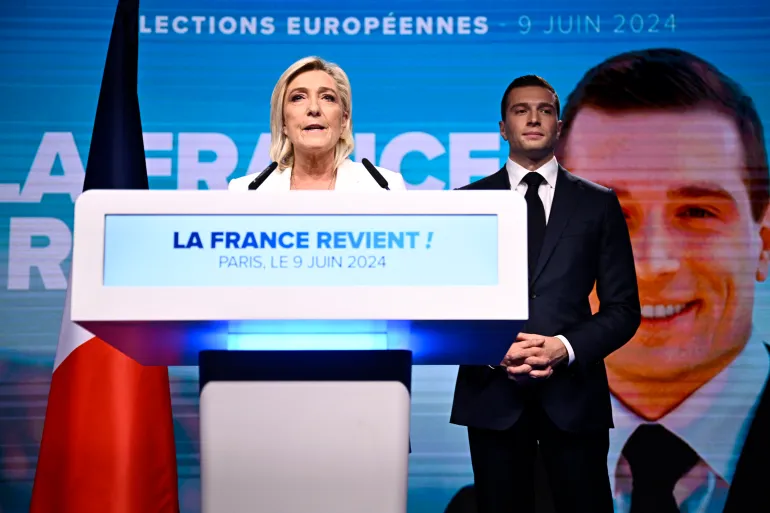Far-right parties have made notable gains in the European Union parliamentary elections, causing significant setbacks for the parties led by German Chancellor Olaf Scholz, French President Emmanuel Macron, and Austrian Chancellor Karl Nehammer.
While mainstream parties retained control of the 705-member European Parliament, the 27-member bloc noticeably shifted to the right, highlighting the persistence of anti-establishment sentiment across the continent.
In France, Marine Le Pen’s National Rally defeated Macron’s centrist Renaissance, prompting the French leader to call snap legislative elections. This risky move could lead to further losses for his party and hinder the remaining three years of his presidential term. National Rally was projected to secure about 33 percent of the vote and 31 seats in the new European Parliament, more than double the 15 percent tally of Macron’s ticket.
“We’re ready to turn the country around, ready to defend the interests of the French, ready to put an end to mass immigration,” Le Pen said. Macron acknowledged the defeat, saying, “I’ve heard your message, your concerns, and I won’t leave them unanswered … France needs a clear majority to act in serenity and harmony,” emphasizing his commitment to democratic principles by calling a snap election.
In Germany, the far-right Alternative for Germany (AfD) secured second place, demonstrating the party’s strength ahead of next year’s federal election. The Eurosceptic party was projected to receive over 16 percent of the vote, its best performance to date and surpassing the combined vote share of all three parties in Scholz’s coalition. The opposition conservative alliance of the Christian Democratic Union and the Christian Social Union topped the poll with about 30 percent of the vote. Germany’s Greens were the biggest losers, dropping 8.5 percentage points to 12 percent, as voters punished them for the costs of policies aimed at reducing CO2 emissions.
Scholz’s Social Democratic Party (SPD) and the third coalition partner, the pro-business Free Democratic Party (FDP), were projected to win about 14 percent and 5 percent of the vote, respectively, down from 15.8 percent and 5.4 percent in the previous election. The AfD’s strong showing comes despite several scandals and controversies, including their lead candidate declaring that the SS, the Nazis’ main paramilitary force, were “not all criminals.” AfD co-leader Alice Weidel attributed their success to growing anti-European sentiment, citing frustrations with Brussels’ bureaucracy and plans to ban CO2-emitting cars.
In Austria, the far-right Freedom Party gained nearly 26 percent of the vote, topping a nationwide ballot for the first time. The governing conservative People’s Party (OeVP) secured more than 24 percent of the vote, followed by the Social Democrats with about 23 percent and the Greens at nearly 11 percent. Chancellor Nehammer pledged to address voters’ concerns ahead of national elections, including cracking down on undocumented migration.
Italian Prime Minister Giorgia Meloni’s position was strengthened as her right-wing populist Brothers of Italy more than doubled its seats in parliament. In the Netherlands, Geert Wilders’s anti-immigration Party for Freedom was projected to win six seats, just two seats shy of the total won by center-left and green parties. Left-wing and green parties fared better in Scandinavia, with far-right and populist parties in Sweden, Denmark, and Finland seeing declines in their vote shares.
In Hungary, Prime Minister Viktor Orban’s nationalist Fidesz won the most votes but lost significant ground compared to the 2019 elections, securing 44 percent of the vote with nearly 90 percent of votes counted, down from 52 percent. Orban claimed victory, stating, “Today, we defeated the old opposition, the new opposition, and no matter what the opposition will be called the next time, we will defeat them again and again.” Orban’s main challenger, Peter Magyar’s Tisza party, garnered about 30 percent of the vote.
Overall, mainstream and pro-European groups remained the dominant forces, with center-right and center-left parties on track to secure a slimmed-down majority in the 705-member parliament. The European People’s Party (EPP) was projected to be the largest grouping with 189 deputies, followed by the center-left Progressive Alliance of Socialists and Democrats with 135 seats. The European Conservatives and Reformists group, which includes the Brothers of Italy, was projected to win 72 seats, followed by the far-right Identity and Democracy with 58. Green and liberal, pro-European parties experienced significant losses, with Greens-European Free Alliance and Renew Europe losing over 40 seats.
European Commission President Ursula von der Leyen said the election results showed the “centre is holding.” She stated, “We won the European elections. This election has given us two messages. First, there remains a majority in the center for a strong Europe, and that is crucial for stability. In other words, the centre is holding. But it is also true that the extremes on the left and on the right have gained support, and this is why the result comes with great responsibility for the parties in the centre.”
According to the reports Eurosceptic parties would form a large bloc in the next parliament, potentially influencing climate policies, agriculture policies, and migration policies in countries like Germany and the Netherlands. However, it is highlighted that the far-right parties are not united, with divisions among themselves, despite attempts to reach out to each other, such as Marine Le Pen’s outreach to Giorgia Meloni in Italy. The impact and influence of these groups remain to be seen.










